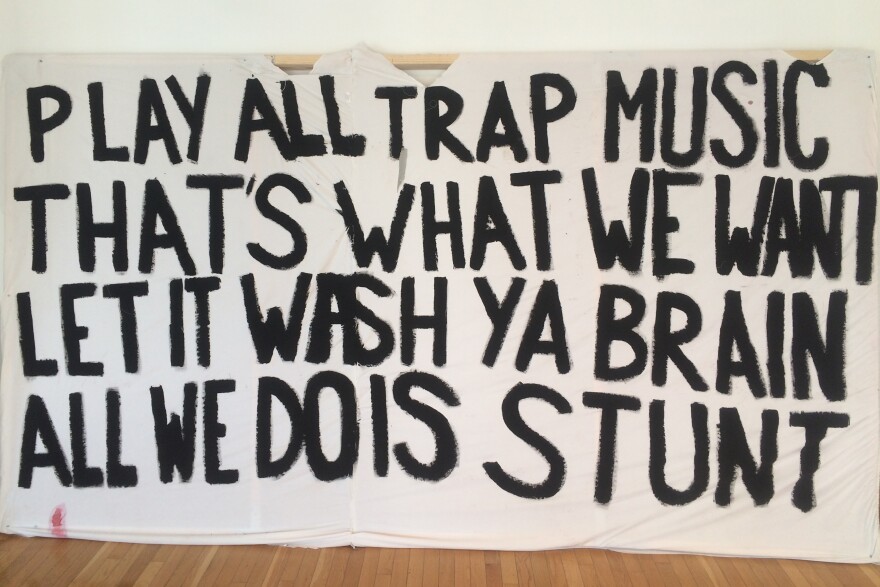“Play All Trap Music/That's What We Want/Let it wash ya brain/All We Do Is Stunt.”
In the first stanza of a new poem, multimedia artist DarianWigfall examines how corporations run by the wealthy profit from art forms they didn’t develop. He says the work takes aim at corporations and wealthy classes that appropriate minority voices.
Wigfall turned his poem into a series of large-scale paintings currently on view at the Kranzberg Arts Center. The show is titled “Hidden Messages: The Subtlety of Oppression.”
“[They] will take the culture from the smaller groups of people, boil it down to its most essential parts, and then sell it back to them as something that wasn’t theirs in the first place,” he said.

Wigfall collaborated on the paintings with Emily Timmerman, whose work is also on display. The poem and paintings were inspired by trap music, a form of hip-hop southern rappers created about a decade ago that fuses beats from a drum machine with sampled electronic music and vocals.
While writing the one-stanza poem about the music, several months ago, it occurred to Wigfall that popularized versions of the music are mindless forms increasingly utilized to generate profits for big companies that seek to profit from hip-hop, the modern music and culture that has given voice to a new generation of black artists. His work attempts to explore language that could be developed by authentic communities, or developed by corporate marketing departments to sell music products.
“This could be said by black people or it could be said by rich people that want black people to listen to trap music, and still basically mean the same thing,” Wigfall said.
Popularized by southern rappers like Waka Flacka Flame, Gucci Mane, and producer Lex Luger, trap emerged from a history of economic oppression, racial injustice, and heavy reliance on the Roland TR-808 Drum Machine.
Wigfall expanded his initial writing after friends compared the poem’s themes to those in “We Real Cool: Black Men and Masculinity,” an essay by noted cultural theorist bell hooks.

The artist, who also works at the Nine Network and as part of the music collective FarFetched, saw the work as a natural fit for the Kranzberg space. He recognized the combination between the building’s large windows and his large paintings would accentuate the permeable boundary between street traffic and art gallery and become a sort of social experiment.
“What I really wanted to see was what people’s reaction was to these messages, to see if they were picking up on what I was saying, first of all, and … what were their interpretations of those messages,” he said.
Wigfall’s work will be showing through the end of July.
If You Go
What: Hidden Messages: The Subtlety of Oppression
Where: Kranzberg Art Center Gallery, 501 N. Grand Blvd., St. Louis
When: Through July 31







